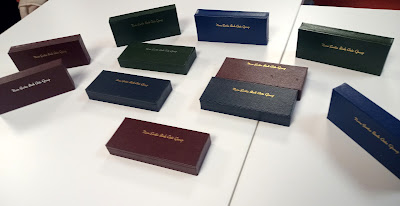You can purchase lead, of course, although it is quite expensive. You can also buy small weights, ready-made, so that's certainly an option. But, if you just want to make a couple of small weights without spending a lot of money, there are other possibilities. Definitely check around your home and see if you have any small, heavy items that could be used, such as steel ball bearings or heavy bolts, nails, etc, that could be used to fill up a small box.
Here's how we did it.
We started by making a small box with book board. These are the dimensions we used, in inches. Assemble the box, using PVA glue, leaving the top of the box open, of course. For our weight-making project, we had a few chunks of lead but not enough to fill all the boxes. So we put the chunks of lead in the box and then filled the rest of the space with aquarium gravel.
Then, to really fill it up, we poured glue in as well.
When you're satisfied with what's inside the box, attach the lid. Then it's helpful to place a weight on top of the box and let the glue dry for a while.
We covered our weights with a durable, starch-filled book cloth. There are various approaches to covering a box and all are acceptable here. We prepared the covering as a single piece like this: Glue the cloth to one side of the box and rub it down firmly. Then work your way around the box, gluing one side at a time, firmly rubbing the cloth each time to remove any air bubbles. Let that dry for a while and then your finshed weight is ready to use. Certainly, the beauty of making your own small weights, is that you can make them whatever size you find useful or whatever shape best suits the heavy object(s) inside.
It was lovely to see everyone who came out for the meeting this week. See you next time!
Submitted by Rhonda Miller







